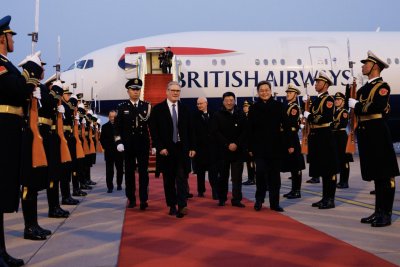China ends sanctions on 6 British MPs

British Prime Minister Keir Starmer (C) on Friday announced China ended its sanctions on six ministers of Parliament a day after arriving for a state visit to China in Beijing. Photo by Lauren Hurley/EPA
Jan. 30 (UPI) — Six British ministers of Parliament, including two peers, no longer are sanctioned by China, British Prime Minister Keir Starmer announced Friday.
Starmer confirmed the sanctions — imposed over criticisms of China’s treatment of its Muslim-minority Uyghur population — immediately were lifted amid warming relations between China and Britain. He made the announcement during a diplomatic trip to Beijing.
“I raised that issue whilst I was here,” Starmer said while interviewed in China. “The Chinese are absolutely clear in their response: The restrictions no longer apply.”
Chinese President Xi Jinping said all British members of Parliament were welcome in China, Starmer told the BBC.
The sanctions included a now-lifted travel ban. Starmer said their removal affirms the effectiveness of his diplomatic approach to the matter.
The prime minister also said he hopes Xi will attend the 2027 G20 summit scheduled to take place in Britain.
China imposed the sanctions on nine Britons, including five Conservative Party ministers and two members of the House of Lords, in 2021 after they raised concerns about human rights violations by China against Uyghurs, a Muslim population in northwest China.
China’s population is more than 90% Han, while Uyghurs account for less than 1% of its people.
The affected MPs and peers said they find “no comfort” in the lifting of sanctions.
Sanctions remain in place for others, and the ministers said they “will not be silenced” on the matter.
China has pressured foreign governments to forcibly return Uyghurs and others to China, “where they are subject to torture and enforced disappearances,” U.S. Secretary of State Marco Rubio said in March.
